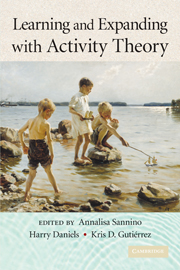Book contents
- Frontmatter
- Contents
- Contributors
- Editors' introduction
- 1 Activity Theory Between Historical Engagement and Future-Making Practice
- PART ONE UNITS OF ANALYSIS
- PART TWO MEDIATION AND DISCOURSE
- PART THREE EXPANSIVE LEARNING AND DEVELOPMENT
- 8 The Concept of Development in Cultural-Historical Activity Theory: Vertical and Horizontal
- 9 Two Theories of Organizational Knowledge Creation
- 10 Contradictions of High-Technology Capitalism and the Emergence of New Forms of Work
- 11 Spinozic Reconsiderations of the Concept of Activity: Politico-Affective Process and Discursive Practice in Transitive Learning
- PART FOUR SUBJECTIVITY, AGENCY, AND COMMUNITY
- PART FIVE INTERVENTIONS
- Bibliography
- Author Index
- Subject Index
8 - The Concept of Development in Cultural-Historical Activity Theory: Vertical and Horizontal
Published online by Cambridge University Press: 05 June 2012
- Frontmatter
- Contents
- Contributors
- Editors' introduction
- 1 Activity Theory Between Historical Engagement and Future-Making Practice
- PART ONE UNITS OF ANALYSIS
- PART TWO MEDIATION AND DISCOURSE
- PART THREE EXPANSIVE LEARNING AND DEVELOPMENT
- 8 The Concept of Development in Cultural-Historical Activity Theory: Vertical and Horizontal
- 9 Two Theories of Organizational Knowledge Creation
- 10 Contradictions of High-Technology Capitalism and the Emergence of New Forms of Work
- 11 Spinozic Reconsiderations of the Concept of Activity: Politico-Affective Process and Discursive Practice in Transitive Learning
- PART FOUR SUBJECTIVITY, AGENCY, AND COMMUNITY
- PART FIVE INTERVENTIONS
- Bibliography
- Author Index
- Subject Index
Summary
Throughout his career, Yrjö Engeström's work has been characterized by his ability to bridge theory and research originating in Russia with similar work from Western Europe and North America. In this regard, he has been prominent in Finland's historical role as a mediator between these differently organized and oriented competitors on the world stage.
In this chapter, as part of the celebration of Yrjö's career, we address the issue of theories of human development as one strategically promising site for East and West to learn from each other, to find their common origins, to evaluate their divergences, and to create understanding across the borders of Russia and Eastern European countries, on the one hand, and those dominated by the West, including Western Europe, on the other. This is a propitious time for such an effort because there has been an unprecedented flow of ideas in recent decades across the divides of former Cold War adversaries; this has provided new and promising opportunities to synthesize common understandings and to better locate fundamental issues where it appears that there are disagreements that need to be understood and, perhaps, resolved.
As vast as it is, the topic of human development cannot be given an exhaustive treatment in a single chapter, so we have decided to organize our discussion through an exploration of an issue that Engeström raises in his Learning by Expanding (1987) – the question of “purpose,” or teleology, in development.
- Type
- Chapter
- Information
- Learning and Expanding with Activity Theory , pp. 129 - 143Publisher: Cambridge University PressPrint publication year: 2009
- 10
- Cited by



